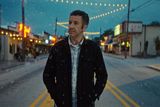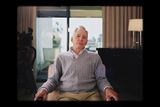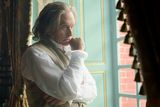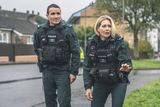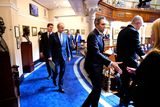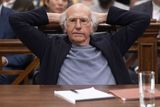John Boland's week in TV: Friendly first names at Facebook, Generation Porn, and the return of Poldark
House of Art: Síghle Bhreathnach Lynch, former curator at the National Gallery of Ireland, and presenter Mick O'Dea
As its title suggested, House of Art (RTÉ1) was a programme about the arts and so RTÉ screened it at such a late hour that most viewers who might have been interested had already gone to bed.
Time was when our national broadcaster professed some sort of commitment to the arts, with series such as Arts Lives offering regular and sometimes substantial profiles of writers, musicians and other cultural figures.
Nowadays, though, it's more intent on slavishly fulfilling HL Mencken's mantra that nobody ever lost any money by underestimating the taste of the public, and thinks it's paying lip service to cultural matters with the likes of Ireland's Favourite Folk Song, which didn't even bother to pick songs you or I would deem to be in the folk idiom.
And so House of Art, which concerned the portraits of political figures that hang in Leinster House, was welcome, even if it was a one-off and even if it wasn't terribly interesting - though presenter Mick O'Dea, who's a former RHA president and a portrait painter himself, did have knowledgeable and informative things to say about the techniques used by the various artists.
But their subjects, ranging from Éamon de Valera to Bertie Ahern, were invariably ageing men in suits who took themselves very seriously and who were just as invariably flattered by their portraitists - indeed, only Derek Hill's depiction of Garret FitzGerald and Carey Clarke's striking take on Albert Reynolds registered as quirky rather than fawning.
Needless to say, women were notable by their absence, either as subjects or as painters. This was an old boys' club and O'Dea was remiss in not pointing out that fact, and indeed in failing to wonder why there were no portraits of such distinguished public representatives as Mary Robinson and Mary McAleese or such ministers as Nora Owen, Máire Geoghegan-Quinn and Mary Harney.
Women were more noticeable in Inside the Social Network: Facebook's Difficult Year (BBC2), though they were only given first names, as indeed were the men in this supposedly access-all-areas account of how the global media giant is reacting to the very bad publicity it's been getting in the past two years.
So how to deal with all the accusations of data leaks, fake news, hate speech, bullying, financial scams and other awful things that Facebook has enabled?
Well, first get the BBC's film-makers to go along with the laid-back, we're-just-like-you aura by sticking to friendly first names; then readily admit to all of your past mistakes while assuring the viewer that radical new steps are being taken to stop them ever happening again.
Most important, though, is to have a noble mission statement, such as that enunciated by Hema, who's "director of social good" and who insisted that Facebook's true objective was "to bring the world together and to give power to the global community to bring a better world".
She said this with a straight face, and "director of product" Kyle wasn't laughing, either, when he told a gathering of new Facebook employees that doing good for the world was their priority and that "we're not a company that is designed to make money".
The film was shot in London, Dublin, Paris and Silicon Valley, all of whose offices looked identical. And those who were interviewed sounded the same, too, as they extolled their virtuous calling. They seemed convinced and surely the 2.3 billion people who've signed up to Facebook across the world can't be wrong, either.
What, though, about the 92 million people worldwide who visit the Porn Hub site every day? In Generation Porn (Channel 4), there was some fretting about how "the internet was made for porn" and how children and adolescents can access it with just a couple of clicks on their laptops, tablets or smartphones.
This all started in 2006 when online porn suddenly became free, with the result that, as one porn producer put it, it's become so mainstream that "even if you're not looking for porn, it's going to find you".
The documentary, though, was less concerned with finger-wagging than with a genuine spirit of enquiry - and less arch, too, than Louis Theroux's ventures into this territory. And he was being arch again in Louis Theroux: Surviving America's Most Hated Family (BBC2), where he revisited a loathsome Baptist group in Topeka, Kansas, whom he'd first filmed in 2006 and then again in 2010. So why give the oxygen of publicity to these gay-haters for a third time? That was never explained throughout the whole horrible hour.
Poldark (BBC1) has returned for a fifth and, so we're assured, final season. But there was a lot of life in last weekend's first episode, its dashing hero managing new feats of heroism as he saved the monarch from assassination in a theatre, got his old friend and mentor out of jail and was offered a "covert" role in the protection of England.
What a man, which can't be said about George Warleggan, who was dealing with spouse Elizabeth's death by snivelling and fantasising that she was still alive.
A belated word finally for Shoulder to Shoulder (RTÉ1), which I unaccountably missed last week but which turned out to be an outstanding documentary about rugby's sometimes troubled history and place in a still divided Ireland.
Brian O'Driscoll was the thoughtful and enquiring presenter as he explored the different and often conflicting traditions of north and south and asked some hard questions, both of himself and the viewer, along the way. More, please, from this greatest of Irish players.
Join the Irish Independent WhatsApp channel
Stay up to date with all the latest news

